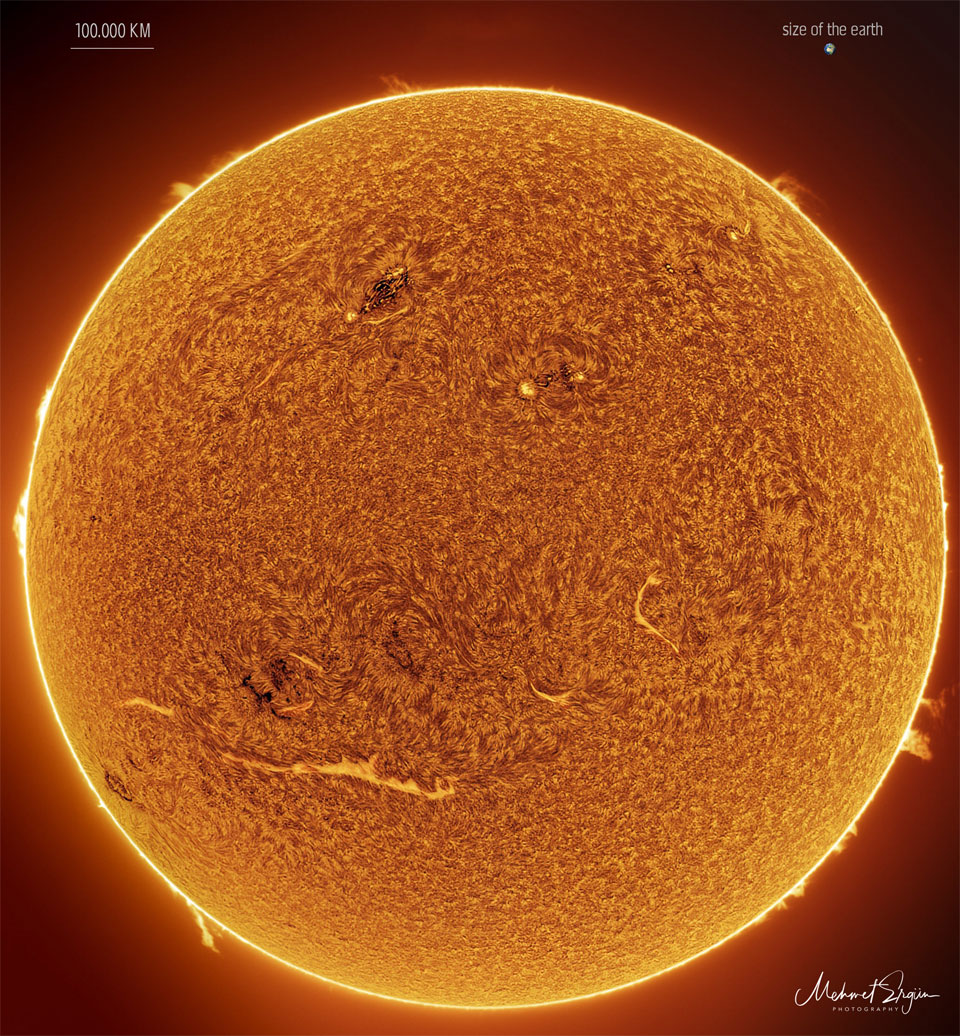Blog
John Dawson Winter III (February 23, 1944 – July 16, 2014) was an American singer and guitarist. Winter was known for his high-energy blues rock albums and live performances in the late 1960s and 1970s. He also produced three Grammy Award-winning albums for blues singer and guitarist Muddy Waters. After his time with Waters, Winter recorded several Grammy-nominated blues albums. In 1988, he was inducted into the Blues Foundation Hall of Fame and in 2003, he was ranked 63rd in Rolling Stone magazine’s list of the “10.
more...
Only two years ago, the Sun was emerging from a solar minimum so quiet that months would go by without even a single sunspot. In contrast, already this year and well ahead of schedule, our Sun is unusually active, already nearing solar activity levels seen a decade ago during the last solar maximum. Our increasingly active Sun was captured two weeks ago sporting numerous interestingfeatures. The image was recorded in a single color of light called Hydrogen Alpha, color-inverted, and false colored. Spicules carpet much of the Sun’s face. The brightening towards the Sun’s edges is caused by increased absorption of relatively cool solar gas and called limb darkening. Just outside the Sun’s disk, several scintillating prominences protrude, while prominences on the Sun’s face are known as filaments and show as light streaks. Magnetically tangled active regions are both dark and light and contain cool sunspots. As our Sun’s magnetic field winds toward solar maximum over the next few years, whether the Sun’s high activity will continue to increase is unknown.

Joseph Benjamin Wilder (February 22, 1922 – May 9, 2014) was an American jazz trumpeter, bandleader, and composer.
Wilder was awarded the Temple University Jazz Master’s Hall of Fame Award in 2006. The National Endowment for the Arts honored him with its highest honor in jazz, the NEA Jazz Masters Award for 2008.
Wilder was born into a musical family led by his father Curtis, a bassist and bandleader in Philadelphia. Wilder’s first performances took place on the radio program “Parisian Tailor’s Colored Kiddies of the Air”. He and the other young musicians were backed up by such illustrious bands as Duke Ellington‘s and Louis Armstrong‘s that were also then playing at the Lincoln Theater. Wilder studied at the Mastbaum School of Music in Philadelphia, but turned to jazz when he felt that there was little future for an African-American classical musician. At the age of 19, Wilder joined his first touring big band, Les Hite’s band.
more...Joseph James LaBarbera (born February 22, 1948) is an American jazz drummer and composer. He is best known for his recordings and live performances with the trio of pianist Bill Evans in the final years of Evans’s career. His older brothers are saxophonist Pat LaBarbera and trumpeter John LaBarbera.
He grew up in Mount Morris, New York. His first drum teacher was his father. For two years in the late 1960s he attended Berklee College of Music, then went on tour with singer Frankie Randall. After Berklee he spent two years with the US Army band at Fort Dix, New Jersey. He began his professional career playing with Woody Herman and the Thundering Herd.
https://www.youtube.com/watch?v=-Z3TJcPEn_c
more...George Holmes “Buddy” Tate (February 22, 1913 – February 10, 2001) was an American jazz saxophonist and clarinetist.
Tate was born in Sherman, Texas, United States, and first played the alto saxophone. According to the website All About Jazz, “Tate was performing in public as early as 1925 in a band called McCloud’s Night Owls.” Tate’s 2001 New York Times obituary stated that “he began his career in the late 1920s, playing around the Southwest with bands led by Terrence Holder, Andy Kirk and Nat Towles.”
Tate switched to tenor saxophone, making a name for himself in bands such as the one led by Andy Kirk.He joined Count Basie in 1939 and stayed with him until 1948. He had been selected by Basie after the death of Herschel Evans, which Tate stated he had predicted in a dream.
more...Zitkala-Ša (Lakota: Zitkála-Šá, meaning Red Bird; February 22, 1876 – January 26, 1938) was a Yankton Dakota writer, editor, translator, musician, educator, and political activist. She was also known by her Anglicized and married name, Gertrude Simmons Bonnin. She wrote several works chronicling her struggles with cultural identity, and the pull between the majority culture in which she was educated, and the Dakota culture into which she was born and raised. Her later books were among the first works to bring traditional Native American stories to a widespread white English-speaking readership.
She was co-founder of the National Council of American Indians in 1926, which was established to lobby for Native people’s right to United States citizenship and other civil rights they had long been denied. Zitkala-Ša served as the council’s president until her death in 1938. Zitkala-Ša has been noted as one of the most influential Native American activists of the 20th century. Working with American musician William F. Hanson, Zitkala-Ša wrote the libretto and songs for The Sun Dance Opera (1913), the first American Indian opera. It was composed in romantic musical style, and based on Sioux and Ute cultural themes. Zitkala-Ša was born on February 22, 1876, on the Yankton Indian Reservation in South Dakota. She was raised by her mother, Ellen Simmons, whose Dakota name was Thaté Iyóhiwiŋ (Every Wind or Reaches for the Wind). Her father was a Frenchman named Felker, who abandoned the family when Zitkala-Ša was very young.
more...
This featured image by the Hubble Space Telescope suggests that star cluster NGC 1850‘s size and shape are reminiscent of the many ancient globular star clusters which roam our own Milky Way Galaxy’s halo. But NGC 1850’s stars are all too young, making it a type of star cluster with no known counterpart in the Milky Way. Moreover, NGC 1850 is also a double star cluster, with a second, compact cluster of stars visible here just to the right of the large cluster’s center. Stars in the large cluster are estimated to be 50 million years young, while stars in the compact cluster are younger still, with an age of about 4 million years. A mere 168,000 light-years distant, NGC 1850 is located near the outskirts of the Large Magellanic Cloud galaxy. The glowing gas filaments across the image left, like supernova remnants in our own galaxy, testify to violent stellar explosions and indicate that short-lived massive stars have recently been present in the region.

more...
Edward Haydn Higgins (February 21, 1932 – August 31, 2009) was an American jazz pianist, composer, and orchestrator. His performance and composition in 1959’s “Cry of Jazz” is preserved in the Library of Congress’ National Film Registry.
Born and raised in Cambridge, Massachusetts, United States, Higgins initially studied privately with his mother. He started his professional career in Chicago, Illinois, while studying at the Northwestern University School of Music and earned a spot in fellow Northwestern alumnus Paul Severson‘s band in 1956 before leading his own band in 1957.
For more than two decades Higgins worked at some of Chicago’s most prestigious jazz clubs, including the Brass Rail, Preview Lounge, Blue Note, Cloister Inn and Jazz, Ltd. His longest and most memorable tenure was at the long-gone London House, where he led his jazz trio from 1957 to the late 1960s, playing opposite jazz stars of this period, including Cannonball Adderley, Bill Evans, Erroll Garner, Stan Getz, Dizzy Gillespie, Wes Montgomery, Oscar Peterson and George Shearing, among others. Later, Higgins said the opportunities to play jazz music with Coleman Hawkinsand Oscar Peterson were unforgettable moments. Higgins spent his time at the London House Restaurant with bassist Richard Evans and drummer Marshall Thompson. Higgins also worked for Chess Records as a producer.
more...Eunice Kathleen Waymon (February 21, 1933 – April 21, 2003), known professionally as Nina Simone was an American singer, songwriter, pianist, and civil rights activist. Her music spanned styles including classical, folk, gospel, blues, jazz, R&B, and pop.
The sixth of eight children born from a poor family in Tryon, North Carolina, Simone initially aspired to be a concert pianist. With the help of a few supporters in her hometown, she enrolled in the Juilliard School of Music in New York City. She then applied for a scholarship to study at the Curtis Institute of Music in Philadelphia, where, despite a well received audition, she was denied admission, which she attributed to racism. In 2003, just days before her death, the Institute awarded her an honorary degree.
To make a living, Simone started playing piano at a nightclub in Atlantic City. She changed her name to “Nina Simone” to disguise herself from family members, having chosen to play “the devil’s music” or so-called “cocktail piano”. She was told in the nightclub that she would have to sing to her own accompaniment, which effectively launched her career as a jazz vocalist. She went on to record more than 40 albums between 1958 and 1974, making her debut with Little Girl Blue. She had a hit single in the United States in 1958 with “I Loves You, Porgy“. Her musical style fused gospel and pop with classical music, in particular Johann Sebastian Bach, and accompanied expressive, jazz-like singing in her contralto voice.
Simone was born on February 21, 1933, in Tryon, North Carolina. Her father, John Divine Waymon, worked as a barber and dry-cleaner as well as an entertainer, and her mother, Mary Kate Irvin, was a Methodist preacher. The sixth of eight children.
more...Tadley Ewing Peake Dameron (February 21, 1917 – March 8, 1965) was an American jazz composer, arranger, and pianist.
Born in Cleveland, Ohio, Dameron was the most influential arranger of the bebop era, but also wrote charts for swing and hard bop players. The bands he arranged for included those of Count Basie, Artie Shaw, Jimmie Lunceford, Dizzy Gillespie, Billy Eckstine, and Sarah Vaughan. In 1940-41 he was the piano player and arranger for the Kansas City band Harlan Leonard and his Rockets. He and lyricist Carl Sigman wrote “If You Could See Me Now” for Sarah Vaughan and it became one of her first signature songs. According to the composer, his greatest influences were George Gershwin and Duke Ellington.
more...A massive galaxy cluster in the constellation Cetus dominates the centre of this image from the NASA/ESA Hubble Space Telescope. This image is populated with a serene collection of elliptical and spiral galaxies, but galaxies surrounding the central cluster — which is named SPT-CL J0019-2026 — appear stretched into bright arcs, as if distorted by a gargantuan magnifying glass. This cosmic contortion is called gravitational lensing, and it occurs when a massive object like a galaxy cluster has a sufficiently powerful gravitational field to distort and magnify the light from background objects. Gravitational lenses magnify light from objects that would usually be too distant and faint to observe, and so these lenses can extend Hubble’s view even deeper into the Universe. This observation is part of an ongoing project to fill short gaps in Hubble’s observing schedule by systematically exploring the most massive galaxy clusters in the distant Universe, in the hopes of identifying promising targets for further study with both Hubble and the NASA/ESA/CSA James Webb Space Telescope. This particular galaxy cluster lies at a vast distance of 4.6 billion light years from Earth. Each year, the Space Telescope Science Institute is inundated with observing proposals for Hubble, in which astronomers suggest targets for observation. Even after selecting only the very best proposals, scheduling observations of all of Hubble’s targets for a year is a formidable task. There is sometimes a small fraction of observing time left unused in Hubble’s schedule, so in its ‘spare time’ the telescope has a collection of objects to explore — including the lensing galaxy cluster shown in this image. [Image description: A cluster of large galaxies, surrounded by various stars and smaller galaxies on a dark background. The central cluster is mostly made of bright elliptical galaxies that are surrounded by a warm glow.

More Posts
- Daily Roots with Jacob Miller, Johnny Clarke, Freddie McGregor, Carlene Davis, Don Carlos etc
- The Cosmos with Serpens Nebula
- Esther Phillips Day
- Frank Morgan Day
- Chet Baker Day
- World Music with Moya Brennan
- Daily Roots with Easton Clarke
- The Cosmos with IC 4970 and NGC 6872
- Frank Gambale Day
- John Patitucci Day
- World Music with Bwiti
- Daily Roots with Joe White & the Reggae Crusaders
- Happy Winter Solstice 2018
- The Cosmos with Sh2-140
- Paco de Lucia Day
- Frank Zappa Day
- Hank Crawford Day
- World Music with Antonio José Cortés Pantoja “Chiquetete”
- Daily Roots with Trinity
- HAIR a tribal musical January 31st thru February 10th 2019
